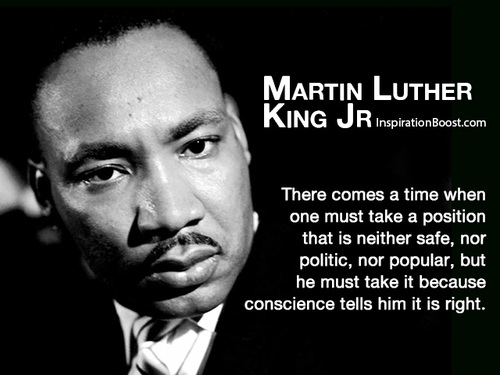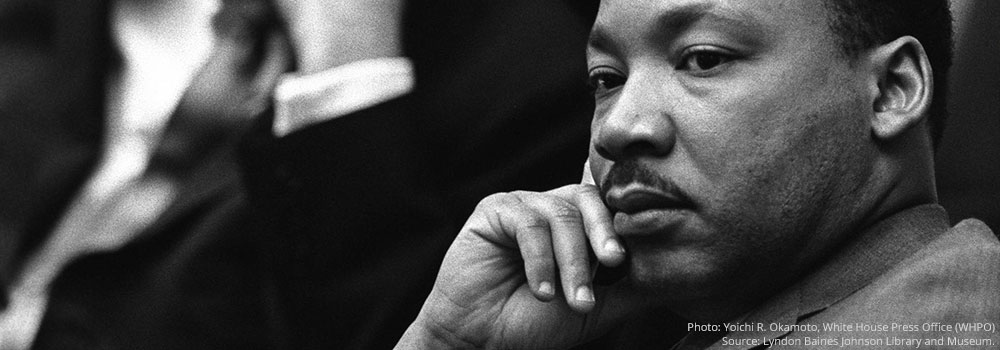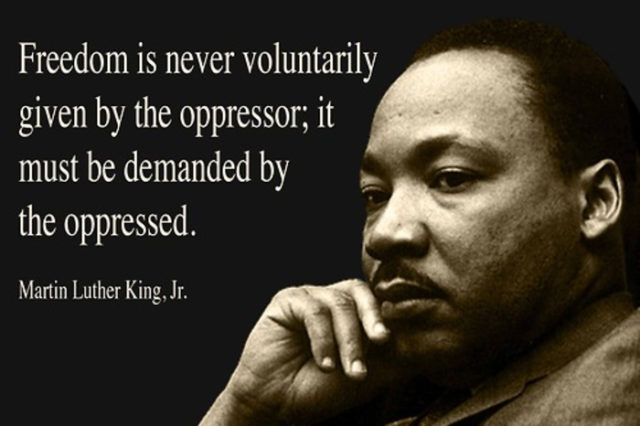Happy Birthday DR. Martin Luther King Jr. Here are some facts you may not know.
Martin Luther King Jr. (1929-1968) was a Baptist minister and social activist who played a key role in the American civil rights movement from the mid-1950s until his assassination in 1968. Explore 10 surprising facts about the civil rights leader and 1964 Nobel Peace Prize winner.
1. King’s birth name was Michael, not Martin.
The civil rights leader was born Michael King Jr. on January 15, 1929. In 1934, however, his father, a pastor at Atlanta’s Ebenezer Baptist Church, traveled to Germany and became inspired by the Protestant Reformation leader Martin Luther. As a result, King Sr. changed his own name as well as that of his 5-year-old son.
2. King entered college at the age of 15.
King was such a gifted student that he skipped grades nine and 12 before enrolling in 1944 at Morehouse College, the alma mater of his father and maternal grandfather. Although he was the son, grandson and great-grandson of Baptist ministers, King did not intend to follow the family vocation until Morehouse president Benjamin E. Mays, a noted theologian, convinced him otherwise. King was ordained before graduating college with a degree in sociology.
3. King received his doctorate in systematic theology.
After earning a divinity degree from Pennsylvania’s Crozer Theological Seminary, King attended graduate school at Boston University, where he received his Ph.D. degree in 1955. The title of his dissertation was “A Comparison of the Conceptions of God in the Thinking of Paul Tillich and Henry Nelson Wieman.”
4. King’s “I Have a Dream” speech was not his first at the Lincoln Memorial.
Six years before his iconic oration at the March on Washington, King was among the civil rights leaders who spoke in the shadow of the Great Emancipator during the Prayer Pilgrimage for Freedom on May 17, 1957. Before a crowd estimated at between 15,000 and 30,000, King delivered his first national address on the topic of voting rights. His speech, in which he urged America to “give us the ballot,” drew strong reviews and positioned him at the forefront of the civil rights leadership.
5. King was imprisoned nearly 30 times.
According to the King Center, the civil rights leader went to jail 29 times. He was arrested for acts of civil disobedience and on trumped-up charges, such as when he was jailed in Montgomery, Alabama, in 1956 for driving 30 miles per hour in a 25-mile-per-hour zone.
6. King narrowly escaped an assassination attempt a decade before his death.
On September 20, 1958, King was in Harlem signing copies of his new book, “Stride Toward Freedom,” in Blumstein’s department store when he was approached by Izola Ware Curry. The woman asked if he was Martin Luther King Jr. After he said yes, Curry said, “I’ve been looking for you for five years,” and she plunged a seven-inch letter opener into his chest. The tip of the blade came to rest alongside his aorta, and King underwent hours of delicate emergency surgery. Surgeons later told King that just one sneeze could have punctured the aorta and killed him. From his hospital bed where he convalesced for weeks, King issued a statement affirming his nonviolent principles and saying he felt no ill will toward his mentally ill attacker.
7. King’s last public speech foretold his death.
King had come to Memphis in April 1968 to support the strike of the city’s black garbage workers, and in a speech on the night before his assassination, he told an audience at Mason Temple Church: “Like anybody, I would like to live a long life. Longevity has its place. But I’m not concerned about that now … I’ve seen the Promised Land. I may not get there with you. But I want you to know tonight, that we, as a people, will get to the Promised Land. And I’m happy tonight. I’m not worried about anything. I’m not fearing any man. Mine eyes have seen the glory of the coming of the Lord.”
8. Members of King’s family did not believe James Earl Ray acted alone.
Ray, a career criminal, pled guilty to King’s assassination but later recanted. King’s son Dexter met publicly with Ray in 1997 and argued for the case to be reopened. King’s widow, Coretta, believed the Mafia and local, state and federal government agencies were deeply involved in the murder. She praised the result of a 1999 civil trial in which a Memphis jury decided the assassination was the result of a conspiracy and that Ray was set up to take the blame. A U.S. Department of Justice investigation released in 2000 reported no evidence of a conspiracy.
9. King’s mother was also slain by a bullet.
On June 30, 1974, as 69-year-old Alberta Williams King played the organ at a Sunday service inside Ebenezer Baptist Church, Marcus Wayne Chenault Jr. rose from the front pew, drew two pistols and began to fire shots. One of the bullets struck and killed King, who died steps from where her son had preached nonviolence. The deranged gunman said that Christians were his enemy and that although he had received divine instructions to kill King’s father, who was in the congregation, he killed King’s mother instead because she was closer. The shooting also left a church deacon dead. Chenault received a death penalty sentence that was later changed to life imprisonment, in part due to the King family’s opposition to capital punishment.
10. George Washington is the only other American to have had his birthday observed as a national holiday.
In 1983 President Ronald Reagan signed a bill that created a federal holiday to honor King. The holiday, first commemorated in 1986, is celebrated on the third Monday in January, close to the civil rights leader’s January 15 birthday.
More Background Info about Dr. Martin Luther King Jr
During the less than 13 years of Dr. Martin Luther King, Jr.’s leadership of the modern American Civil Rights Movement, from December, 1955 until April 4, 1968, African Americans achieved more genuine progress toward racial equality in America than the previous 350 years had produced. Dr. King is widely regarded as America’s pre-eminent advocate of nonviolence and one of the greatest nonviolent leaders in world history.
 Drawing inspiration from both his Christian faith and the peaceful teachings of Mahatma Gandhi, Dr. King led a nonviolent movement in the late 1950’s and ‘60s to achieve legal equality for African-Americans in the United States. While others were advocating for freedom by “any means necessary,” including violence, Martin Luther King, Jr. used the power of words and acts of nonviolent resistance, such as protests, grassroots organizing, and civil disobedience to achieve seemingly-impossible goals. He went on to lead similar campaigns against poverty and international conflict, always maintaining fidelity to his principles that men and women everywhere, regardless of color or creed, are equal members of the human family.
Drawing inspiration from both his Christian faith and the peaceful teachings of Mahatma Gandhi, Dr. King led a nonviolent movement in the late 1950’s and ‘60s to achieve legal equality for African-Americans in the United States. While others were advocating for freedom by “any means necessary,” including violence, Martin Luther King, Jr. used the power of words and acts of nonviolent resistance, such as protests, grassroots organizing, and civil disobedience to achieve seemingly-impossible goals. He went on to lead similar campaigns against poverty and international conflict, always maintaining fidelity to his principles that men and women everywhere, regardless of color or creed, are equal members of the human family.
Dr. King’s “I Have a Dream” speech, Nobel Peace Prize lecture and “Letter from a Birmingham Jail” are among the most revered orations and writings in the English language. His accomplishments are now taught to American children of all races, and his teachings are studied by scholars and students worldwide. He is the only non-president to have a national holiday dedicated in his honor, and is the only non-president memorialized on the Great Mall in the nation’s capitol. He is memorialized in hundreds of statues, parks, streets, squares, churches and other public facilities around the world as a leader whose teachings are increasingly-relevant to the progress of humankind.
Some of Dr. King’s most important achievements include:
 In 1955, he was recruited to serve as spokesman for the Montgomery Bus Boycott, which was a campaign by the African-American population of Montgomery, Alabama to force integration of the city’s bus lines. After 381 days of nearly universal participation by citizens of the black community, many of whom had to walk miles to work each day as a result, the U.S. Supreme Court ruled that racial segregation in transportation was unconstitutional.
In 1955, he was recruited to serve as spokesman for the Montgomery Bus Boycott, which was a campaign by the African-American population of Montgomery, Alabama to force integration of the city’s bus lines. After 381 days of nearly universal participation by citizens of the black community, many of whom had to walk miles to work each day as a result, the U.S. Supreme Court ruled that racial segregation in transportation was unconstitutional.
- In 1957, Dr. King was elected president of the Southern Christian Leadership Conference (SCLC), an organization designed to provide new leadership for the now burgeoning civil rights movement. He would serve as head of the SCLC until his assassination in 1968, a period during which he would emerge as the most important social leader of the modern American civil rights movement.
- In 1963, he led a coalition of numerous civil rights groups in a nonviolent campaign aimed at Birmingham, Alabama, which at the time was described as the “most segregated city in America.” The subsequent brutality of the city’s police, illustrated most vividly by television images of young blacks being assaulted by dogs and water hoses, led to a national outrage resulting in a push for unprecedented civil rights legislation. It was during this campaign that Dr. King drafted the “Letter from a Birmingham Jail,” the manifesto of Dr. King’s philosophy and tactics, which is today required-reading in universities worldwide.
- Later in 1963, Dr. King was one of the driving forces behind the March for Jobs and Freedom, more commonly known as the “March on Washington,” which drew over a quarter-million people to the national mall. It was at this march that Dr. King delivered his famous “I Have a Dream” speech, which cemented his status as a social change leader and helped inspire the nation to act on civil rights. Dr. King was later named Time magazine’s “Man of the Year.”
- In 1964, at 35 years old, Martin Luther King, Jr. became the youngest person to win the Nobel Peace Prize. His acceptance speech in Oslo is thought by many to be among the most powerful remarks ever delivered at the event, climaxing at one point with the oft-quoted phrase “I believe that unarmed truth and unconditional love will have the final word in reality. This is why right temporarily defeated is stronger than evil triumphant.”
- Also in 1964, partly due to the March on Washington, Congress passed the landmark Civil Rights Act, essentially eliminating legalized racial segregation in the United States. The legislation made it illegal to discriminate against blacks or other minorities in hiring, public accommodations, education or transportation, areas which at the time were still very segregated in many places.
- The next year, 1965, Congress went on to pass the Voting Rights Act, which was an equally-important set of laws that eliminated the remaining barriers to voting for African-Americans, who in some locales had been almost completely disenfranchised. This legislation resulted directly from the Selma to Montgomery, AL March for Voting Rights lead by Dr. King.
- Between 1965 and 1968, Dr. King shifted his focus toward economic justice – which he highlighted by leading several campaigns in Chicago, Illinois – and international peace – which he championed by speaking out strongly against the Vietnam War. His work in these years culminated in the “Poor Peoples Campaign,” which was a broad effort to assemble a multiracial coalition of impoverished Americans who would advocate for economic change.
- Dr. Martin Luther King, Jr.’s less than thirteen years of nonviolent leadership ended abruptly and tragically on April 4th, 1968, when he was assassinated at the Lorraine Motel in Memphis, Tennessee. Dr. King’s body was returned to his hometown of Atlanta, Georgia, where his funeral ceremony was attended by high-level leaders of all races and political stripes.
- For more information regarding the assassination trial of Dr. King. Click here.
- For more information regarding the Transcription of the King Family Press Conference on the MLK Assassination Trial Verdict December 9, 1999 Atlanta, GA. Click Here
- For more information regarding the Civil Case: King family versus Jowers. Click here.
- Later in 1968, Dr. King’s wife, Mrs. Coretta Scott King, officially founded the Martin Luther King, Jr. Center for Nonviolent Social Change, which she dedicated to being a “living memorial” aimed at continuing Dr. King’s work on important social ills around the world.
SOURCE: THE KING CENTER

























